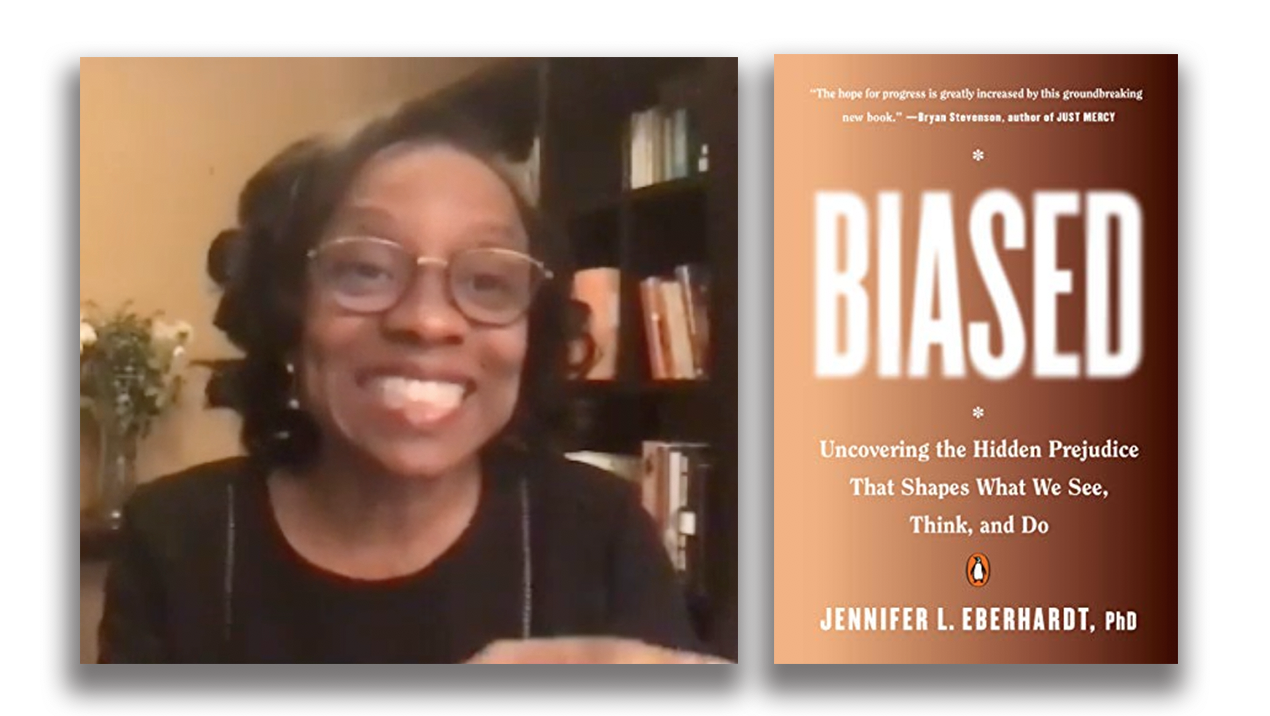The author of "Biased: Uncovering the Hidden Prejudice That Shapes What We See, Think, and Do," joined the Elon community for a live discussion of the university's Common Reading selection on Sept. 9.
After months of reading, discussing and reflecting upon the university’s 2020 Common Reading selection, Elon students, faculty and staff had the chance to hear from the author herself about the book and her views on race and bias in America.
In “Biased: Uncovering the Hidden Prejudice That Shapes What We See, Think, and Do,” author Jennifer L. Eberhardt exposes and addresses racial biases that exist at all levels of society. The author urges readers to recognize how perceptions of race shape every interaction and then encourages them to address the issue and work toward positive change.
Eberhardt joined the Elon community in a live discussion of the book Wednesday evening. Joining Eberhardt in the online conversation was Paula Patch, senior lecturer in English and assistant director of first-year initiatives of the Elon Core Curriculum, who moderated the discussion. Eberhardt answered several of the 150 questions submitted by students and instructors prior to the event.
Students, faculty and staff interested in viewing the entire discussion can do so, using their Elon login information, here.

Questions ranged from Eberhardt’s thoughts on recent cries for social justice, to her extensive research on policing, to teaching children how to recognize and understand bias – specifically about how and when to teach them about it. Eberhardt urged parents to consider having difficult conversations about race with their children at early ages.
“Just because we’re not talking to our kids about race doesn’t mean that they’re not absorbing the same things that we are,” said Eberhardt, a Stanford University professor and MacArthur “Genius” Grant recipient. “And when we don’t talk to them, we’re leaving them on their own to grapple with this, to deal with this, to try to figure out what it all means.”
When asked for her suggestions for combating systemic racism, Eberhardt touted the roles of self-reflection and accountability, but also discussed the importance of relying on intelligence rather than intuition. Eberhardt highlighted work she and a team of researchers from Stanford conducted with the Oakland Police Department in 2017. Their research showed a sharp decline in the number of stops from 2017 to 2018, as they encouraged officers to ask a simple question before making each stop: “Is this stop intelligence-led, yes or no?”
Eberhardt and her team found that the question required officers to truly consider their reasons for stopping a particular individual and whether there was prior information tying them to a specific crime. Eberhardt says practicing this kind of restraint can be beneficial for all people, not just officers.
“We should be thinking about slowing down. We should ask ourselves the right questions,” Eberhardt said. “For ourselves, we should replace our intuition with intelligence, we should hold ourselves accountable. These are all strategies that we can take to try to combat bias.”
Each year the Common Reading marks the beginning of the Elon Core Curriculum, the shared courses and experiences that put knowledge into practice and enable the integration of learning across the disciplines. First-year students were encouraged to purchase and read “Biased” prior to their arrival on campus this fall and have been engaging in shared intellectual experiences related to the book throughout the semester.
The Common Reading was required in COR 110: The Global Experience courses and is being discussed in many ENG 110 and Elon 101 classes across campus. However, the conversations have not only been reserved for students.
In June, Patch joined President Connie Ledoux Book and other campus leaders in a virtual discussion of the book, and conversations have continued across campus between students, faculty and staff from a number of departments and organizations. Additionally, Elon is scheduling a virtual discussion of “Biased” for parents, grandparents and other family members in October, with more details to come.
In her charge to the Elon community during Wednesday’s virtual discussion, Eberhardt invoked the words of the late Congressman John Lewis, who once said, “freedom is not a state; it is an act.” Eberhardt encouraged students, faculty and staff to take action against social injustice.
“Act now, let’s act now to try to really chart a path forward and to really make progress on these issues,” she said. “The time for freedom is now. The time for action is now.”



